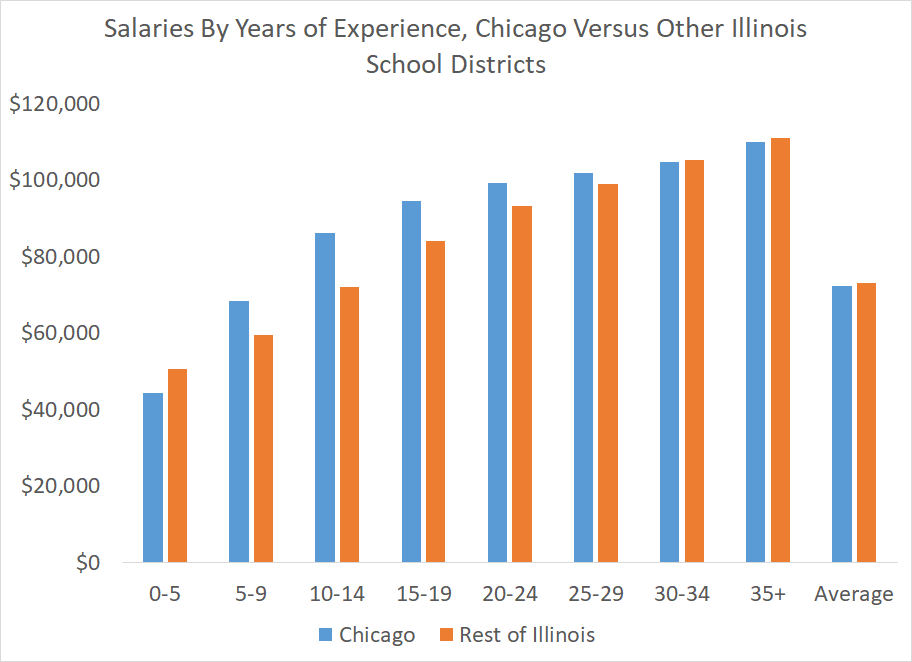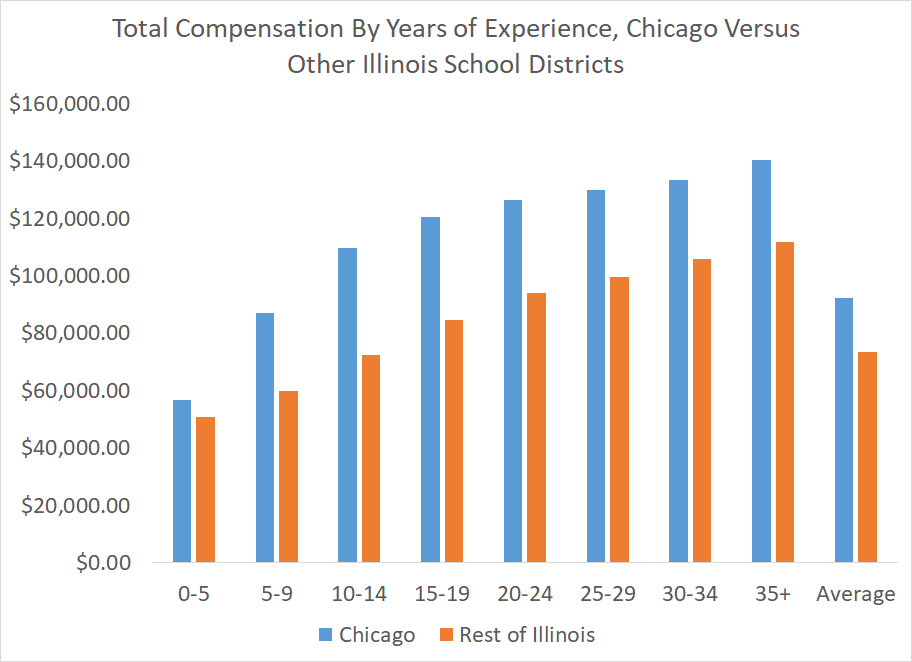Earlier this month, Chicago Mayor Lori Lightfoot said, "Teachers in Chicago Public Schools are paid some of the highest compensation of any school system in the country." Politifact Illinois rated this claim as "mostly false," but I think they missed a few key elements*. If I were rating it, I'd call Lightfoot's claim "mostly true." Let me explain why.
According to NCTQ, Chicago's starting teacher salary ranks 22nd out of 124 large school districts, and near the top for teachers with more years of experience and higher degrees. Because large school districts tend to pay higher salaries than most school districts other than suburban ones, it's reasonable to conclude that Chicago teacher salaries are some of the highest in the counry.
However, those findings only look at salaries, not the total compensation claim that Lightfoot was making. Due to the fact that Chicago pays much higher pension costs compared to the rest of Illinois (and to districts in other states), I would have agreed with the Mayor's statement that Chicago's total teacher compensation is much higher than other places.
Let me walk you through some numbers to show what I mean. I pulled data directly from the Chicago city and Illinois state teacher pension funds. For all members in each plan (including teachers and other educators), the pension plans report data on average salaries by experience level. According to their respective pension plans, Chicago has lower starting salaries than other educators across the state of Illinois, but for all educators between five and 29 years of experience, Chicago pays higher salaries.

From the pension plans, we also know how many educators fall into each of these experience categories. About 77 percent of all Chicago educators fall under the higher-paid experience bands. The majority of Chicago educators are earning salaries that are 3-16 percent higher than educators in the rest of the state of Illinois.
But that's just salaries and does not include pension costs. Due to the fact that Chicago pays for its own pension plan while the rest of the state does not, Chicago as a district is paying MUCH higher pension costs. After a budget compromise in 2017, Chicago is still paying 27 percent of each teacher's salary toward the city pension fund, whereas the rest of Illinois' school districts are paying just 0.68 percent toward the state pension fund. That is an enormous disparity. (This is solely about the employer costs of pensions, but Chicago also "picks up" 7 percent of the employee's pension contribution, which is another area where Chicago is a bit of an outlier in Illinois, and certainly compared to districts in other states.) Once you factor in these pension disparities, Chicago has much higher compensation costs for educators at every level of experience.
The graph below combines the salary differences and the pension disparities. As the graphic shows, depending on the employee's years of experience, Chicago is paying 10-34 percent higher compensation costs compared with educators in the rest of the state. Illinois ranks as one of the higher-paid states in terms of salaries, and Chicago's pension costs some of the highest in the country.

It's possible there are still some a few suburban districts in Illinois paying higher teacher compensation than Chicago. But those would be rare and far between once you factor in the much-higher pension costs that Chicago is paying. The data here are not adjusted for cost of living, do not include health care costs, and they include all education employees, not just teachers, but I would still classify Chicago as having higher compensation costs than almost all other school districts.
*Disclosure: I spoke with Politifact Illinois reporter Kiannah Sepeda-Miller about the article, mainly about one particular pension angle called "pension pickups," but I didn't know the full claim she was investigating and would have come to different conclusions than she did.
Taxonomy:
